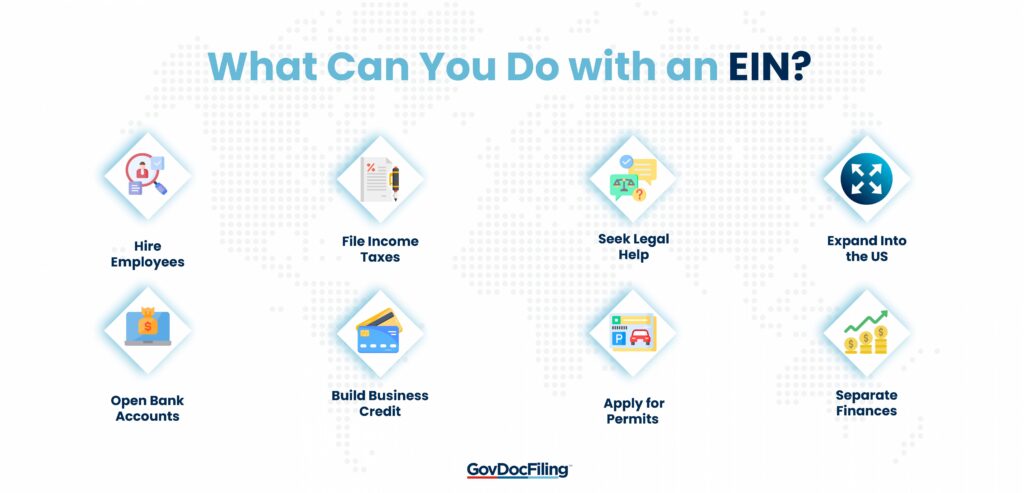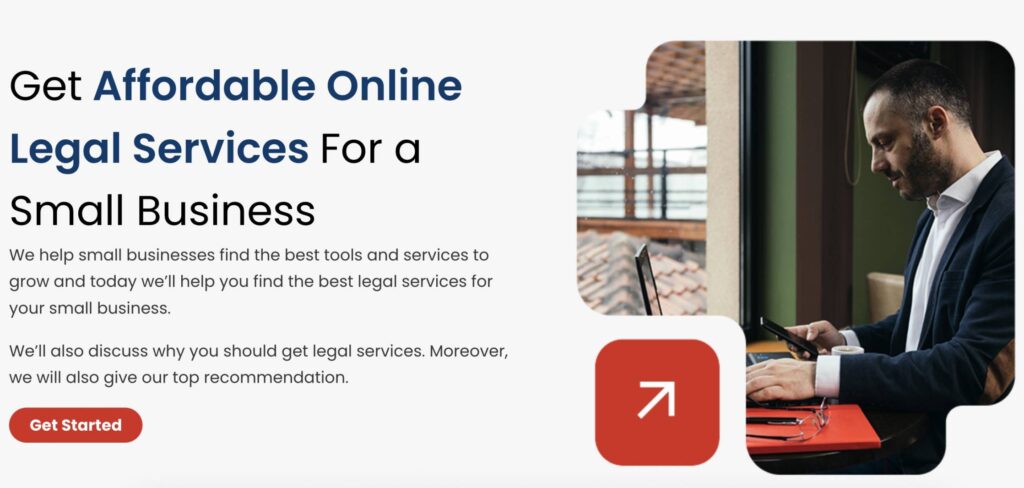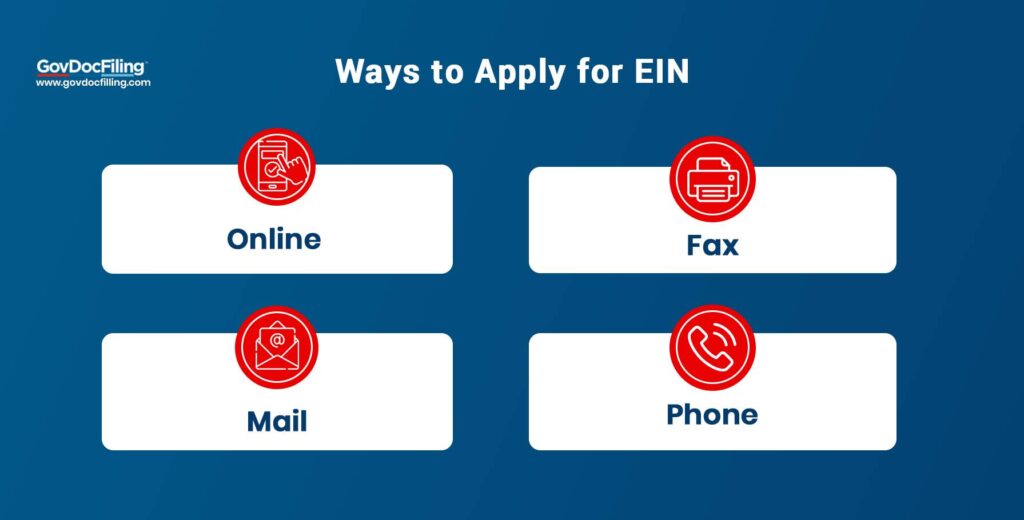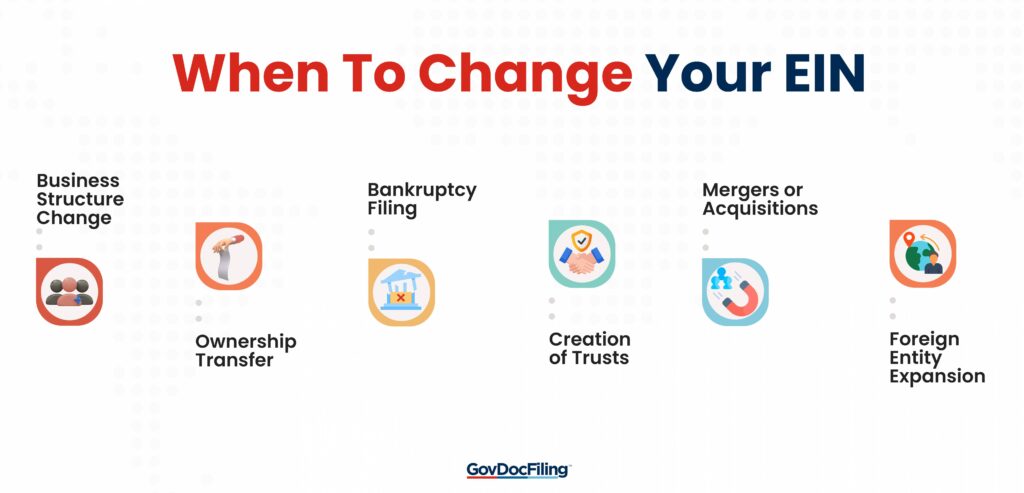An Employer Identification Number (EIN) is a nine-digit number issued by the IRS.
Your EIN is the official tax identifier for your business. It doesn’t expire, and cannot be transferred to another business entity. It continues to be tied to your company, even if you stop using it temporarily.
The Internal Revenue Service set it up this way to avoid confusion and ensure that businesses always have a permanent tax identifier. Unlike licenses or permits that expire, the EIN functions more like a business’s Social Security Number.
If you’re worried about being hit by penalties for failure to renew your EIN, don’t worry. This article is here to help you understand what your EIN is, how it works, and if and when you need to renew your EIN.
What Is an EIN?
An Employer Identification Number (EIN) is a unique number that the IRS (Internal Revenue Service) uses to identify a company for tax purposes. You use it to report taxes, hire employees, and handle other official paperwork with government agencies.
The EIN helps the IRS track a business’s financial activity and ensures that taxes are reported under the correct entity.
It’s required for corporations, partnerships, and most limited liability companies. Sole proprietors may also need it if they hire employees or set up retirement plans.
So, the big question:
Do you need to renew your EIN yearly?
The short answer is no, but keep reading to get the details. But first, let’s understand why you need an EIN in the first place.
Also Read:
Things You Can Do With an EIN
An EIN makes it easier to operate your business professionally and legally. Here are some practical things you can do with it.

Hire Employees
An EIN is a must if you plan to employ people. It’s required for reporting employment taxes to the IRS and handling payroll. Without it, you can’t set up the right tax accounts that allow you to pay Social Security and Medicare contributions.
EINs also facilitate a smooth hiring process because many state and federal forms ask for them before any approval is stamped. It signals that your business is operating properly and helps you stay compliant while growing your team.
File Income Taxes
Every business needs to file taxes, and your EIN is the identifier that ties those returns to your company. Whether you run a corporation, partnership, or LLC, you’ll use this number each year when sending information to the IRS.
Even if you’re a sole proprietor, you need an EIN to separate your personal and business finances. It keeps your filings clean and prevents mix-ups with your personal Social Security number.
Seek Legal Help
An EIN is required if your business needs to go through certain legal processes. For example, if you file for bankruptcy, the court will ask for your EIN. This helps link the proceedings directly to your business entity.
This number also comes into play in other legal filings. Having an EIN ready makes it easier to work with attorneys, courts, and official agencies when your business is involved in legal matters.
If handling legal processes isn’t your area of expertise, use the business legal services offered by our partners. It’s affordable for small businesses.

Image via GovDocFiling
Expand Into the US
An EIN makes it easier for a foreign company to operate legally in the US. It’s often required to open a business bank account, pay federal taxes, and file necessary paperwork with the IRS. And since you don’t need to renew your EIN, you won’t need to update this information later.
Getting an EIN also makes it possible for a foreign company to hire employees in the US. It’s needed to run payroll, withhold taxes, and submit employee-related filings. Many states also require an EIN to register for state-level taxes or permits.
Also Read:
Open Bank Accounts
Most banks won’t let you open a business bank account without an EIN. It’s their way of making sure your company is legitimate and properly registered. This step also separates your business transactions from your personal banking transactions.
With a dedicated business account, you’ll have an easier time managing expenses, tracking profits, and showing professionalism to clients and vendors. It also simplifies things at tax time because your records are already organized.
Build Business Credit
Just like people use Social Security numbers to build personal credit, businesses use EINs to build a business credit history. An EIN allows you to apply for credit cards, lines of credit, or loans in your business name. And, you don’t need to renew your EIN, so there’s no need for periodic updates.
Over time, responsible use of credit tied to your EIN helps establish a business credit history. If you have a good credit history, you can easily qualify for better financing options and build trust with lenders.
Apply for Business Permits
Most federal, state, and local agencies ask for an EIN when you apply for business permits and licenses. The EIN acts as the official identification number for your company.
An EIN also makes it easier to keep your records consistent across different agencies. Whether you’re applying for a sales tax permit, a health permit, or an industry-specific license, using the same EIN ensures all filings link back to the same business.
Separate Finances
An EIN helps you distinguish between your personal and business finances. By using it to set up accounts and manage taxes, you avoid mixing personal finances with business operations.
This separation protects your personal assets and creates cleaner records. It also shows professionalism to partners, clients, and lenders since you’re treating your business as its own entity.
When Are You Required to Change or Renew Your EIN?
You don’t ever need to renew your EIN as it doesn’t have an expiry date. However, there are special circumstances where you may need to change it. They include the following.
Business Structure Changes
One of the main reasons for needing a new EIN is a change in the legal structure of your business. For example, if a sole proprietorship incorporates, becomes an LLC, or forms a partnership, a new EIN is required.
The same applies when a partnership becomes a corporation or when major restructuring changes how the IRS views your business. The new number ensures that the tax records match the new entity.
Note that you can’t renew your EIN, but you will need an entirely new one.
Ownership Changes
You may also need to change your EIN if there is a shift in ownership.
For example, if an existing partnership takes on a new partner or removes one, the IRS may require a new number. Again, you can’t renew your EIN, but you need to apply for a new one.
Similarly, if a sole proprietorship is sold to another individual, the new business owner cannot use the old EIN or renew it. They must apply for their own. Here are the various ways in which you can apply.

Also Read:
Bankruptcy or Court-Ordered Changes
In some cases, businesses that go through bankruptcy or court-ordered reorganization may need a new EIN. This happens because the restructured entity is legally treated as a new business.
The IRS uses the new number to separate past financial obligations from the current records. In this case, as well, you can’t renew your EIN for the new business.
Creating Trusts or Estates
A trust or estate that needs an EIN for tax reporting is treated separately from an individual or business. When a trust is created or an estate is established after someone passes away, a new EIN is required.
These numbers are tied directly to the trust or estate and don’t overlap with the personal Social Security Number of the individual.
Mergers and Acquisitions
Mergers or consolidations also require a new EIN. If two corporations merge to form a new one, that new entity needs its own number.
Additionally, if another corporation absorbs one and only one survives, the surviving corporation may keep its EIN, but the other must close its number.
Foreign Entity Registration
Foreign entities that expand into the United States may also need a new EIN if they create a US branch or subsidiary.
This ensures that the IRS can track tax obligations separately from the parent company overseas. It also prevents confusion between international and US. tax reporting.
Also Read:
How to Update EIN Information for Your Business
While you don’t need to renew your EIN, you may need to update your information from time to time. Here’s how.
- Assess the Need for an Update: First, evaluate whether your business actually needs an EIN update. You only need to update your EIN if you change the business structure, business name, or the responsible parties.
- Gather Necessary Documentation: You need to support the EIN update with necessary documentation. For example, if it’s a change of ownership, you need to provide the details of the new owners and a new article of incorporation.
- Verify the Information: Any mistake in your application to update or renew your EIN will cause delays. So, ensure everything is accurate.
- Choose a Submission Method: You can update/renew your EIN through the IRS online portal, physically submit the application by mail, or electronically fax it.
- Notify Relevant Parties: Besides updating the IRS, you also need to keep your bank, vendors, partners, and relevant government agencies in the loop. A new EIN update needs to be reflected in loan agreements, articles of organization, vendor contracts, and more.
- Keep It Safe: After notifying relevant parties and updating all crucial documents with the new EIN, keep it safe. You will need to refer to it in the course of running your business. It’s ideal if you have it on hand to avoid tax delays and complications.
Why You Don’t Need to Renew Your EIN
The IRS doesn’t require you to renew your Employer Identification Number. The system is set up this way for the following practical reasons.
- They act as permanent tax IDs for business entities, similar to how a Social Security Number works for individuals. So, just like you don’t renew your SSN, you don’t need to renew your EIN, as it’s permanent.
- The IRS uses EINs to keep consistent tax records over a business’s life without requiring you to renew your EIN.
- You don’t need to renew your EIN because the IRS wants to avoid duplicate numbers that could confuse tax reporting.
- Employers, banks, and government agencies all use EINs for verification, so stability and permanence are essential. So, you don’t need to renew your EIN.
- The number is tied to the legal entity, meaning it lasts until that entity is dissolved or restructured into a new type of business.
Also Read:
What Happens if You Misplace Your EIN?
You may be wondering if you need to renew your EIN if you lose it.
Misplacing or forgetting your EIN is common. Fortunately, recovering a lost EIN is easy with the following steps, so you don’t need to renew your EIN.
- Refer to Your Documents: You usually receive your EIN by email or physical mail, depending on your EIN application method. Check your inbox for a copy of your EIN. Alternatively, look for the confirmation letter (CP 575) that the IRS sent you when your EIN was issued.
- Check Your Tax Returns: All the business taxes you have filed in the past contain your EIN. You only need to find one document to access the listed number.
- Call the IRS: There’s a special tax line set up by the IRS that you can call from Monday to Friday to recover your EIN. However, you’ll need to verify your identity as the business owner before they release the information to you.
Also Read:
How to Keep Your EIN Active
Not needing to renew your EIN doesn’t mean you neglect the associated responsibilities. It can become inactive if you ignore tax obligations or let your business go dormant.
Here’s how to keep your EIN active, so you never need to renew your EIN.
- File Tax Returns: Even if your business startup doesn’t make money in a given year, filing tax returns keeps your EIN tied to an active record. Not filing can cause the IRS to treat the EIN as abandoned, which could make future filings harder.
- Pay Employment Taxes if You Hire Staff: Businesses with employees must withhold and pay federal employment taxes under their EIN. Failing to do so can lead to penalties, interest, and potential closure of your EIN account.
- Keep Business Licenses Updated: Many states link their systems with EIN records. If you don’t renew licenses or update business registrations, your EIN may remain valid federally, but you’ll face legal issues at the state level.
- Use Your EIN for Business Banking and Contracts: Banks and vendors expect to see your EIN on official documents. Consistently using it keeps financial institutions and agencies aligned with your IRS records.
Also Read:
FAQ
1. How do I renew my employer identification number?
You don’t ever need to renew your EIN. Once the IRS issues it, the number is permanent and linked to the legal structure of your business.
Whether you’re operating as a sole proprietorship, limited liability company, partnership, or corporation, the EIN is yours for as long as that business exists in its current form.
The only time you’d need to get a new EIN is if you make major changes to your business structure.
2. What happens if my EIN expires?
EINs don’t expire, so you don’t need to renew your EIN (employer identification number) periodically. Once issued, they remain active for the life of your business. Even if you shut down operations for a while, the number doesn’t go away. It stays attached to your business entity and can be used again if you restart.
What can happen, though, is that the IRS may close your business account if you stop filing payroll taxes for a long time.
That doesn’t mean the EIN itself has expired, only that the IRS isn’t keeping the account active. You’d need to contact them to reopen the account and settle pending taxes if you want to use the number again.
3. Do I have to renew my EIN every year?
No. You don’t need to renew your EIN every year. An EIN isn’t like a license or permit that requires yearly renewal. Once you receive it, you can continue to use it for as long as your business structure stays the same.
There’s no annual paperwork or renewal fee tied directly to the EIN itself.
What you do need to do is keep up with your tax obligations. If you fail to file required returns or reports, the IRS can close the business account tied to your EIN.
The number is still yours, but you’d need to get the account reinstated before you could use it again for tax filings.
4. How do I check if my EIN is still active?
There isn’t a public database where you can look up EIN status. This is mainly to avoid the chances of identity theft. That said, there are ways of checking if an EIN is active or not.
The most direct way is to call the IRS Business & Specialty Tax Line and ask if your EIN is active. You will have to verify your identity and ties to the business you’re looking up before they confirm whether the number is still valid for use.
You can also check by looking at your past tax and business documents. If your EIN has been accepted on recent filings, it’s still active. This also includes your business permits, vendor contracts, or even letters you may have received from government agencies.
If you’ve gone years without filing and are unsure whether the account is open or if you need to renew your EIN, contacting the IRS is the only way to confirm.
5. Can I use the same EIN if I start a new business?
Not always. An EIN is connected to the business entity for which it was issued. If you’re starting a new business with a different structure or ownership, you must apply for a new number.
For example, if you previously ran a sole proprietorship and want to open an LLC, the IRS requires a new EIN.
On the other hand, if you’re just continuing with the same business and making no structural changes, you can keep using the existing number.
You also maintain the EIN if you move your business to another state. This is because you’re still operating under the jurisdiction of the same IRS. The key factor is whether the IRS views your activity as the same or a completely new entity.
Also Read:
Conclusion
To sum up, you don’t need to renew your Employer Identification Number, and it doesn’t expire either. Once the IRS issues you with one, it stays tied to your business for its entire life.
The only time you’ll need a new number is if your business structure or ownership changes in a way that creates a new entity.
You can avoid problems by keeping your EIN active through honoring your tax obligations. Failure to do that, the IRS may close the account, but that doesn’t cancel the EIN itself.
For everything else, your original number stays valid for the life of your business. That consistency makes it easier to manage business taxes, banking, and legal processes without worrying about renewals.

